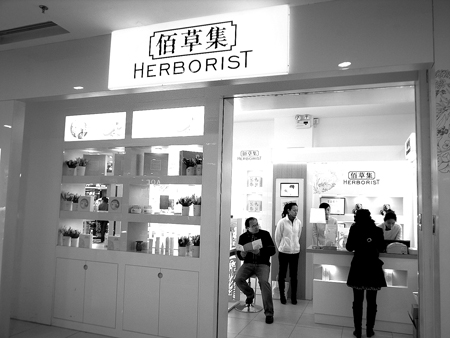Companies
Jahwa to keep domestic tag
By Gao Changxin (China Daily)
Updated: 2011-04-26 11:11
 |
Large Medium Small |
|
 |
|
A shop of Shanghai Jahwa United Co Ltd's "Herborist" brand products. The company will actively expand into the fashion industry after restructuring. [Photo / China Daily] |
Company rules out share sale to wholly owned foreign competitors
SHANGHAI - Shanghai Jahwa United Co Ltd, one of China's top State-owned cosmetics manufacturers, has ruled out investment by wholly owned foreign companies in its planned share sale to become a public company.
Ge Wenyao, Jahwa's chairman, said on Friday that he favored investors with diversified ownership, especially investment funds and financial groups, so that the company could compete more effectively in the domestic market.
|
||||
Jahwa, whose revenue jumped 26.3 percent to 843 million yuan ($129 million) in the first quarter, is currently undergoing restructuring. The company's shares were suspended from trading on the A-share group on the Shanghai Stock Exchange on Dec 7.
After a 9 percent equity transfer to the government-owned Shanghai Chengtou Corp and Shanghai Jiushi Corp last month, Jahwa still has 29.18 percent government-controlled shares up for sale.
Potential bidders for the shares include the sovereign wealth fund China Investment Corp, and Ping An Insurance (Group) Co, in which the Shenzhen government owns a small stake.
Asked whether he has a specific investor in mind, Ge said he is holding talks with several investors as Jahwa is still in the process of due diligence of its assets.
Ge said the assets evaluation and audit could be finalized in May and the restructuring could be completed by the third quarter of this year if everything goes smoothly.
Jahwa's decision is in line with Shanghai's plan to restructure its State-owned enterprises (SOE) to improve efficiency and eliminate business overlaps, which has been gaining traction since the municipal government issued guidelines in 2008.
Yang Guoxing, director of the Shanghai Municipal State-owned Assets Supervision and Administration Commission (SASAC), said in a meeting on Jan 13 that the city plans to raise the securitization rate of local SOEs to 35 percent in 2011 from 30.5 percent at the end of 2010.
By 2016, 90 percent of State-owned industrial conglomerates in Shanghai will go public entirely or will have their core assets listed, according to the Shanghai Municipal SASAC.
Ge said Jahwa's transformation into a wholly owned public company will be beneficial for both the municipal government and Jahwa itself.
With a potential price tag of around 6 billion yuan, the sale would be 400 times the 150-million-yuan profit Jahwa delivered to the government in 2010, which is apparently a good deal, Ge said.
For Jahwa, the switchover will help it get rid of the development restrictions for SOEs, such as the range of business activities it can engage in.
The restructuring will allow Jahwa to actively expand into the broader fashion industry, said Ge. "The industry has a wider profit margin and is an area from which domestic companies are mostly absent," he added.
| 分享按钮 |

